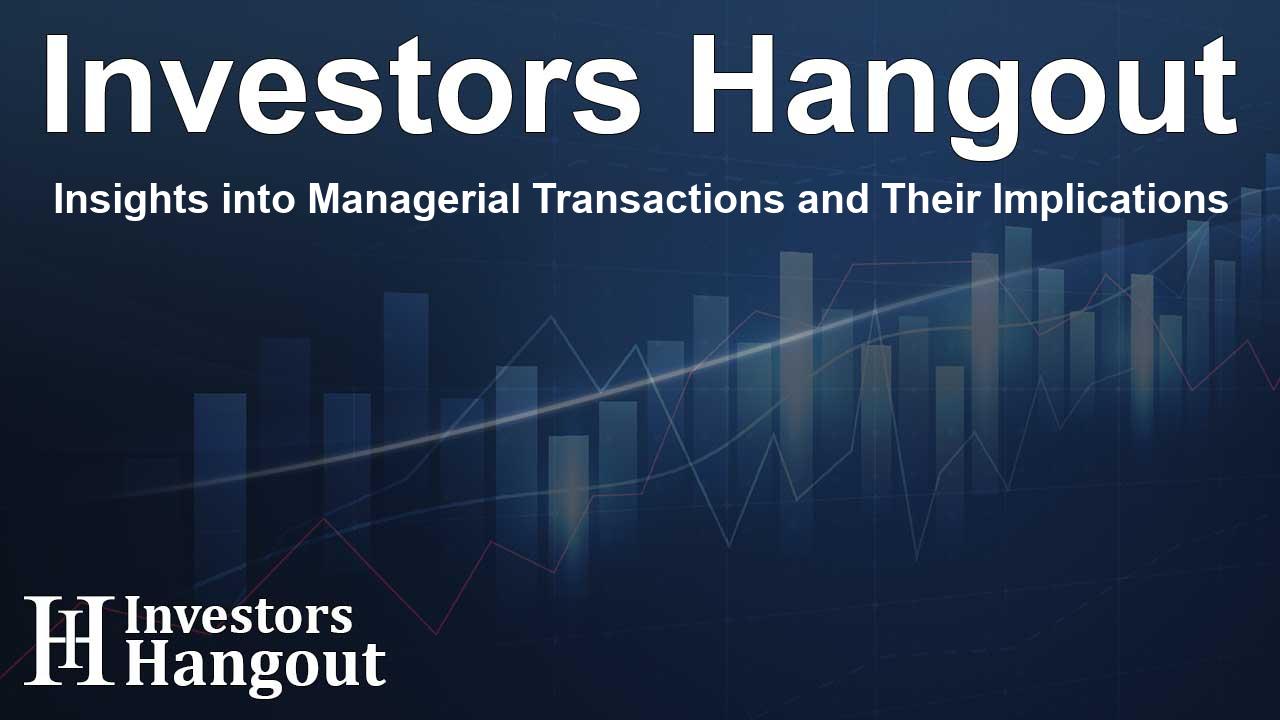Insights into Managerial Transactions and Their Implications

Understanding Managerial Transactions
In the realm of corporate governance, transactional disclosures by individuals in key management roles play a vital part. These notifications, primarily motivated by compliance with the EU Commission's Market Abuse Regulation, ensure transparency and maintain trust among investors.
Importance of Transparency in Management
Consistent transparency in transactions involving persons discharging managerial responsibilities strengthens the integrity of the corporate framework. By requiring disclosures, it allows stakeholders to remain informed about potential conflicts of interest or significant changes influencing the company.
What Are Managerial Transactions?
Managerial transactions refer to any dealings carried out by individuals who hold prominent positions within a company, such as directors or executives. This could encompass share purchases, sales, or any other financial activity that might affect the stock's value.
Associated Individuals
In addition to managerial roles, the regulation also extends to individuals closely associated with these key personnel. This could include family members or trusted advisors who may engage in transactions that could conflict with corporate ethics.
Recent Disclosures in Managerial Transactions
There have been a number of significant disclosures related to managerial transactions that warrant attention. Each transaction not only reflects the activity of the individuals involved but also offers insights into the company's strategic direction and market sentiment.
Examples of Recent Appendices
Among the recent disclosures, specific appendices detailing the transactions of various managerial personnel have been circulated. For example, the appendix detailing Erik Gadeberg outlines notable transactions made on December 17, 2024, shedding light on the strategic decisions made by top executives.
Further disclosures involving other notable figures such as Lars Mørch and Michael C. Mariegaard on the same date provide a pattern of transactions that may be indicative of internal movements or market strategies.
The Role of Regulation
Regulatory frameworks like the EU Market Abuse Regulation necessitate such disclosures, ensuring that market participants are better equipped to make informed decisions. This creates an environment of accountability where management decisions are closely monitored.
Impact on Stakeholders
For stakeholders, understanding these transactions opens a window into the health and strategy of the company. It allows investors to gauge whether they should acquire shares, hold on to their investments, or consider selling based on the information disclosed by management.
Investor Reactions
Investor reactions to these disclosures can vary. Positive transactions, such as executives acquiring shares, may signal confidence in the company’s future, while large sales might raise concerns regarding management’s outlook.
Market Trends Linked to Transactions
Analyzing historical data on managerial transactions provides insights into market trends. Analysts often correlate the timing of executive trades with stock performance, trying to predict market movements that might follow.
Conclusion
The importance of disclosures regarding transactions by managerial personnel cannot be overstated. In the ever-evolving landscape of finance, maintaining transparency ensures a level playing field for all participants and strengthens corporate governance.
Frequently Asked Questions
What are managerial transactions?
Managerial transactions refer to financial dealings carried out by individuals in key management positions within a company.
Why are disclosures required?
Disclosures are necessary to maintain transparency and trust among investors and stakeholders, ensuring fair and informed trading.
How do these transactions affect stock prices?
Management transactions can significantly impact stock prices, as they provide insights into the company’s future prospects and management’s confidence.
Who qualifies as a person closely associated?
A person closely associated includes family members or trusted advisors of those in managerial roles, whose transactions could affect the company.
What is the EU Market Abuse Regulation?
The EU Market Abuse Regulation is a set of rules that enforces transparency and prevents market abuse through the disclosure of certain transactions.
About Investors Hangout
Investors Hangout is a leading online stock forum for financial discussion and learning, offering a wide range of free tools and resources. It draws in traders of all levels, who exchange market knowledge, investigate trading tactics, and keep an eye on industry developments in real time. Featuring financial articles, stock message boards, quotes, charts, company profiles, and live news updates. Through cooperative learning and a wealth of informational resources, it helps users from novices creating their first portfolios to experts honing their techniques. Join Investors Hangout today: https://investorshangout.com/
Disclaimer: The content of this article is solely for general informational purposes only; it does not represent legal, financial, or investment advice. Investors Hangout does not offer financial advice; the author is not a licensed financial advisor. Consult a qualified advisor before making any financial or investment decisions based on this article. The author's interpretation of publicly available data shapes the opinions presented here; as a result, they should not be taken as advice to purchase, sell, or hold any securities mentioned or any other investments. The author does not guarantee the accuracy, completeness, or timeliness of any material, providing it "as is." Information and market conditions may change; past performance is not indicative of future outcomes. If any of the material offered here is inaccurate, please contact us for corrections.